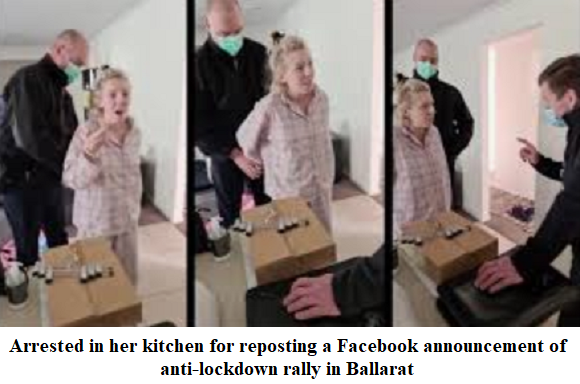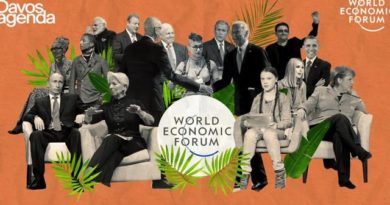How the Great Reset is Capturing our Politics – Quadrant Online

During the pandemic, the people of Melbourne, Australia’s second city, largely lost two years of their lives. For months at a time, they couldn’t travel more than five kilometres from their homes, couldn’t leave home for more than an hour a day, and couldn’t meet anyone outside of their own household without special permission. These extraordinary, unprecedented and draconian restrictions were dictated by experts, enforced by government, and for much of the time passively endured by the population because they were deemed necessary to keep people safe. Yet Melbourne was only a somewhat more extreme version of the scientism and safetyism that afflicted most of the world between 2020 and 2022. Far from viewing this as a catastrophe, to the advocates of what’s become known as the Great Reset the pandemic was less a disaster than a portent of how other challenges might usefully be tackled.
Despite the grotesque overreaction to it, Covid was not the trigger for an organised conspiracy to take away our freedom and to damage our health. It was simply a fearful new challenge that brought out an arrogance in experts, an authoritarianism among officials, and a timidity in our own citizens that was almost as unanticipated as it was unprecedented.
To people with a definite agenda, every crisis has the potential to advance it. For forty years now, the World Economic Forum President, Professor Klaus Schwab, has marketed his annual Davos gathering as a chance to address the key-crisis-of-the-moment, invariably through intensified global elite networking and more joined-up government. Naturally, he seized upon the pandemic as a golden opportunity to push for a more comprehensive version of the health-industrial state that so readily took over people’s daily lives in order to protect us from an illness which people under seventy had a 99.9 per cent chance of surviving.
To the essay writers in this volume, Against the Great Reset, Schwab is a representative-in-chief of the homogenised global elites that seem to have taken over most developed countries’ policy-making and created the administrative state that elected politicians are now struggling to tame. Rather than being a sinister global string-puller, Schwab is an especially well-connected exemplar of the expert class to which elected politicians are increasingly expected to defer. And the problem is less the prevalence of Davos Man than the diffidence of elected leaders in the face of such pseudo-intellectual pretension.
In June 2020, Schwab issued his current version of elite intellectualism:
The Great Reset agenda would have three main components. The first would steer the market towards fairer outcomes … Depending on the country, these may include changes to wealth taxes, the withdrawal of fossil-fuel subsidies and new rules governing intellectual property, trade and competition … The second component of a Great Reset agenda would ensure that investments advance shared goals such as equality and sustainability. Here, the large-scale spending programs that many governments are implementing represent a major opportunity for progress … This means, for example, building “green” urban infrastructure and creating incentives for industries to improve their track record on environmental, social and governance (ESG) metrics … The third and final priority of a Great Reset agenda is to harness the innovations of the Fourth Industrial Revolution to support the public good, especially by addressing health and social challenges. During the Covid 19 crisis, companies, universities and others have joined forces … Imagine what could be possible if similar concerted efforts were made in every sector …
There’s no doubting Schwab’s high-mindedness, but underneath the corporatist jargon there’s also no doubting his preference for bigger, more active government, and smaller, more passive citizens, with the “experts” firmly in charge; a kind of soft authoritarianism, with the pandemic response as a model, to address politically correct problems such climate change, global inequality and racism.
To the critics in this volume, “Davos thinking” has become dangerously entrenched at the top levels of most institutions: hence businesses are run less to produce goods and services than to promote diversity, and economies less to create prosperity than to reduce emissions. Many of these essays deal with the Great Reset only to the extent needed to be part of a volume against it, but nearly all of them are worth reading because of what they have to say about key aspects of contemporary life such as the decline of politics and the politicisation of business. An underlying theme is the extent to which the Marxist zealots who were unable to persuade the working classes to upend the system in order to create equality have been far more influential in persuading the middle classes to upend the system in order to save the planet, to end the patriarchy and to combat racism. Yet like all revolutions, these ones too will end in tears.
One of the most extraordinary features of an almost uniquely dispiriting time was the way the pandemic plans that many governments had developed over decades (none of which involved closing down all non-essential activity for months on end) were junked in favour of versions of the Wuhan plan that could only have happened in a totalitarian state: locking everyone up in the hope that the virus would die out. In a clinical dissection of our pandemic follies, Douglas Murray deplores the collective cowardice behind the failure to blame China for unleashing (even if unintentionally) this scourge upon the world, the absence of any cost-benefit analysis once media-driven panic had taken hold, and the fake science behind all the catastrophic early predictions of doom and the changing instructions about things like masks. The Great Reset, he says, “aims to replace national government with world government, and in an increasingly CCP-dominated world, that would lead in only one direction: against the cause of democratic and financial freedom”.
Roger Kimball sees the Great Reset as the latest chapter in the long fight between the advocates of the big battalions and the little platoons. He contrasts the other-centred passions that most people feel for family, neighbourhood and country, with the self-centred passions of the elites for rules, order and systems that empower them. He says there are two views of liberty: one “affirms tradition, local affection and the subordination of politics to the ordinary business of life. It is a view that looks to the nation state as the primary guarantor of its rights.” The other “is more ambitious but also more abstract. It seeks nothing less than to boost us all up to that plane of enlightenment … through which mankind as a whole (but not alas, individual men, who hardly matter in this calculus) may hope for whatever salvation secularism leavened by utilitarianism may provide.” The Great Reset, he says, is a textbook manifestation of this latter version.
In an enthralling essay, Angelo Codevilla charts the decline of American education into the kind of culturally self-loathing relativist swamp to whose alumni notions like a Great Reset seem plausible. In the Second World War, he says, only 4 per cent of some 18 million US draftees were illiterate. Yet a generation later, despite a massive increase in education funding, 27 per cent of Vietnam War draftees were judged functionally illiterate.
Conrad Black was a regular attendee at Davos for many years and, in a masterly account of the follies of contemporary capitalism, observes that Davos is in favour of democracy and capitalism but only the “right” types. He laments the “venality, cowardice and invertebrate tactical stupidity of much of the corporate world” exemplified by “oil companies putting up slick television praising and purporting to be part of the heroic march to a fossil-free world”. He’s one of several authors here noting the moral decline of businesses that, for instance, boast of their ESG credentials while outsourcing parts of their supply chain to slave labour in Xinjiang or child labour in the Congo.
One of the most instructive chapters is Michael Anton’s analysis of Marxism and capitalism. He contrasts the contemporary capitalism of the IT-facilitated “gig economy” with mid-twentieth-century capitalism characterised by high wages and stable employment. He says that the modern danger is less from old-style socialism than from “the cabal of bankers, techies, corporate executives, politicians, senior bureaucrats, academics and pundits who coalesce around the World Economic Forum and seek to change, reduce, restrict and homogenise the Western way of life—but only for ordinary people”. He says the Great Reset “combines the worst elements of libertarian capitalism with most of the worst of socialism and rolls them together with utterly irredeemable wokeness”.
So how did we get here and what’s to be done? It’s often observed that politics is downstream of culture; less often that culture is downstream of religion. Western civilisation is unimaginable without Christianity with its insistence that every human being has equal worth and its golden rule “Do to others what you would have them do to you”. Hence it really should be no surprise that societies that have not only largely lost their Christian faith but mostly lost even their Christian knowledge should now be in the grip of identity politics where people are morally pigeon-holed on the basis of characteristics they can do nothing to alter. Or that people should be expected to have a “belief” in climate change with its own sets of commandments and anathemas. And to the extent that woke virtue requires saving the planet from the wars of nation-states, from the injustice of global inequality, from the environmental depredations of big business, and from the evils of racism and biologically determined sex, the all-but-inevitable result is politically correct education systems, mass immigration, and renewable energy based on wind turbines and solar panels largely made in China.
Yet for all Western countries’ alleged oppressions, they’re still the only places that others want to flee to, whether that’s Africans seeking a better life or wealthy Chinese who don’t trust their own government. What’s needed is a recovery of self-belief based on the undoubted fact that Western countries remain the world’s most free, fair and prosperous; and that the pre-pandemic, pre-Ukraine, pre-October 7 world was more safe, more rich, more free and more fair for more people than ever before in history, based on seven decades of freer trade, freer speech and freer politics sustained and protected by the US-led global order.
Against the Great Reset is a powerful critique of our contemporary ills and of how Davos Man is making them worse. It doesn’t offer an explicit alternative, although it implicitly points to the eighteenth-century liberal conservatism of Edmund Burke, who saw true freedom as grounded in religion, personal character and social order. Perhaps this volume has helped to prepare the ground for an alternative worldview, that represented by the Alliance for Responsible Citizenship, which has recently held its inaugural conference in London, which aimed to tell “a better story” about the strengths of Western civilisation. To the Davos agenda of climate anxiety, global equality, world governance, woke capitalism and suppressing “misinformation”, the ARC offered freedom of speech, support for small business, protection of the family, patriotism and educational rigour.
Still, at a time of green hysteria, gender confusion, religious scepticism and cultural uncertainty, it will take better political leadership than any major Western country has recently had to craft a political program that’s capable of restoring confidence in our societies. The fact that nearly every country now wants to forget the pandemic as a kind of collective bad dream, rather than rigorously analyse it lest we make the same mistakes again, shows how governance has generally become worse as it’s become bigger and ever more intrusive.
Against the Great Reset: Eighteen Theses Contra the New World Order
edited by Michael Walsh
Bombardier Books, 2022, 474 pages, $49.80
The Hon. Tony Abbott was Prime Minister of Australia from 2013 to 2015
This article has been archived for your research. The original version from Google News can be found here.


